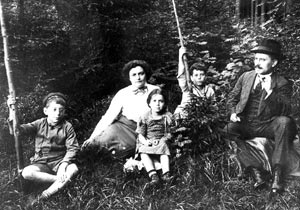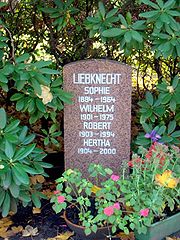
Sophie Liebknecht
Encyclopedia


Russia
Russia or , officially known as both Russia and the Russian Federation , is a country in northern Eurasia. It is a federal semi-presidential republic, comprising 83 federal subjects...
n-born German
Germany
Germany , officially the Federal Republic of Germany , is a federal parliamentary republic in Europe. The country consists of 16 states while the capital and largest city is Berlin. Germany covers an area of 357,021 km2 and has a largely temperate seasonal climate...
socialist and feminist. She was the second wife of Karl Liebknecht
Karl Liebknecht
was a German socialist and a co-founder with Rosa Luxemburg of the Spartacist League and the Communist Party of Germany. He is best known for his opposition to World War I in the Reichstag and his role in the Spartacist uprising of 1919...
, who had three children from his first marriage to Julia Liebknecht.
Born in Rostov-on-Don
Rostov-on-Don
-History:The mouth of the Don River has been of great commercial and cultural importance since the ancient times. It was the site of the Greek colony Tanais, of the Genoese fort Tana, and of the Turkish fortress Azak...
, Sophie was educated in Imperial Germany, where she married the Marxist thinker and soon-to-be revolutionary leader Karl Liebknecht in 1912. Originally a member of the German Social Democratic Party
Social Democratic Party of Germany
The Social Democratic Party of Germany is a social-democratic political party in Germany...
(SPD), she followed her husband when he founded the Communist Party of Germany
Communist Party of Germany
The Communist Party of Germany was a major political party in Germany between 1918 and 1933, and a minor party in West Germany in the postwar period until it was banned in 1956...
in 1918. Karl Liebknecht was murdered January 15, 1919, after the failed Spartacist uprising
Spartacist uprising
The Spartacist Uprising , also known as the January uprising , was a general strike in Germany from January 5 to January 15, 1919. Its suppression marked the end of the German Revolution...
. Sophie moved to London
London
London is the capital city of :England and the :United Kingdom, the largest metropolitan area in the United Kingdom, and the largest urban zone in the European Union by most measures. Located on the River Thames, London has been a major settlement for two millennia, its history going back to its...
before again coming to Germany during the Weimar period
Weimar Republic
The Weimar Republic is the name given by historians to the parliamentary republic established in 1919 in Germany to replace the imperial form of government...
. The members of the Liebknecht family were alarmed by the rise of the Nazi Party in the 1930s, and, fearing for their lives under the regime established by Adolf Hitler
Adolf Hitler
Adolf Hitler was an Austrian-born German politician and the leader of the National Socialist German Workers Party , commonly referred to as the Nazi Party). He was Chancellor of Germany from 1933 to 1945, and head of state from 1934 to 1945...
, chose to live in emigration during this era. The Russian-born Sophie left for the Soviet Union
Soviet Union
The Soviet Union , officially the Union of Soviet Socialist Republics , was a constitutionally socialist state that existed in Eurasia between 1922 and 1991....
in 1934 and settled in Moscow
Moscow
Moscow is the capital, the most populous city, and the most populous federal subject of Russia. The city is a major political, economic, cultural, scientific, religious, financial, educational, and transportation centre of Russia and the continent...
, where she lived for the remaining decades of her life.
Her 1964 funeral was attended by Robert and Wilhelm, Sophie Liebknecht's stepsons from Karl's first marriage. The Soviet government arranged a public ceremony and an honor guard
Honor guard
An honor guard, or ceremonial guard, is a ceremonial unit, usually military in nature and composed of volunteers who are carefully screened for their physical ability and dexterity...
.
Much of her correspondence with Rosa Luxemburg
Rosa Luxemburg
Rosa Luxemburg was a Marxist theorist, philosopher, economist and activist of Polish Jewish descent who became a naturalized German citizen...
has been published.

